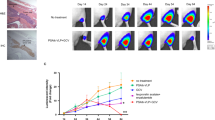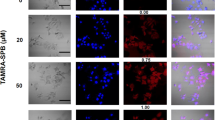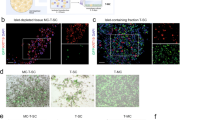Abstract
The prostate-specific antigen (PSA) promoter is known to be highly tissue specific. Although its tissue specificity has been confirmed, its efficiency of gene transcription is significantly lower compared to known nonspecific viral promoters. These lower levels of promoter activity therefore pose a problem when developing an efficacious gene vector for prostate cancer gene therapy. Thus, selecting an appropriate therapeutic gene and vector system to carry the gene driven by the PSA promoter (PSAP) is important. In the studies described here, a human immunodeficiency virus (HIV)-1–based lentiviral vector carrying either the enhanced green fluorescent protein (EGFP) reporter or the diphtheria toxin A (DTA) gene was constructed. The results demonstrate that the PSA promoter in a lentiviral vector drives genes in prostate cells with satisfactory efficacy and specificity. The tissue-specific expression of the DTA protein efficiently eradicates LNCaP prostate cells in culture. We also infected prostate cancer cells and control cells carried by nude mice with the EGFP lentiviral vector. Significant numbers of EGFP-positive LNCaP cells were detected in all the mice bearing these tumors, but no EGFP-positive control cells were detected in any other mouse tissue. The high levels of expression in prostate cells, compared with the low levels of background expression in other cells, show that the PSAP-lentiviral vector could be a potential useful tool for gene therapy of metastatic prostate cancer. Cancer Gene Therapy (2001) 8, 628–635.
This is a preview of subscription content, access via your institution
Access options
Subscribe to this journal
Receive 12 print issues and online access
$259.00 per year
only $21.58 per issue
Buy this article
- Purchase on Springer Link
- Instant access to full article PDF
Prices may be subject to local taxes which are calculated during checkout
Similar content being viewed by others
References
Soderdahl DW, Wettlaufer JN, Corn B, Gomella LG . Neoadjuvant hormonal therapy in the management of prostate cancer: a surgical and radiation therapy review Tech Urol 1996 2: 194–206
Ismail M, Gomella LG . Current treatment of advanced prostate cancer Tech Urol 1997 3: 16–24
Fournier G . Treatment of hormone-refractory prostate carcinoma Eur Urol 1996 30: 32–37
Klotz L . Hormone therapy for patients with prostate carcinoma Cancer 2000 88: 3009–3014
Oh WK, Kandoff PW . Management of hormone refractory prostate cancer: current standards and future prospects J Urol 1998 160: 1220–1229
Wang MC, et al . Prostate antigen: a new potential marker for prostatic cancer Prostate 1981 2: 89–96
Stamey TA, Kabalin JN . Prostate specific antigen in the diagnosis and treatment of adenocarcinoma of the prostate: I. Untreated patients J Urol 1989 141: 1070–1075
Muschenheim F, Omarbasha B, Kardjian PM, Mondou EN . Screening for carcinoma of the prostate with prostate specific antigen Ann Clin Lab Sci 1991 21: 371–380
DeVere-White RW, et al . Urinary prostate specific antigen levels: role in monitoring the response of prostate cancer to therapy J Urol 1992 147: 947–951
Voges GE, Mottrie AM, Stockle M, Muller SC . Hormone therapy prior to radical prostatectomy in patients with clinical stage C prostate cancer Prostate (Suppl) 1994 5: 4–8
Cadeddu JA, et al . Relationship between changes in prostate-specific antigen and prognosis of prostate cancer Urology 1993 42: 383–389
Schild SE, et al . Radiotherapy for isolated increases in serum prostate-specific antigen levels after radical prostatectomy Mayo Clin Proc 1994 69: 613–619
Brausi M, et al . High dose epirubicin is effective in measurable metastatic prostate cancer: a phase II study of the EORTC Genitourinary Group Eur J Cancer 1995 31A: 1622–1626
Riegman PH, et al . The promoter of the prostate-specific antigen gene contains a functional androgen responsive element Mol Endocrinol 1991 5: 1921–1930
Schuur ER, et al . Prostate-specific antigen expression is regulated by an upstream enhancer J Biol Chem 1996 271: 7043–7051
Carulli JP, et al . High throughput analysis of differential gene expression J Cell Biochem (Suppl) 1998 30–31: 286–296
Pang S, et al . Prostate tissue specificity of the prostate-specific antigen promoter isolated from a patient with prostate cancer Hum Gene Ther 1995 6: 1417–1426
Pang S, et al . Identification of a positive regulatory element responsible for tissue-specific expression of prostate-specific antigen Cancer Res 1997 57: 495–499
Lee SE, et al . Development of a new plasmid vector with PSA-promoter and enhancer expressing tissue-specificity in prostate carcinoma cell lines Anticancer Res 2000 20: 417–422
Pang, S . Targeting and eradicating cancer cells by a prostate-specific vector carrying the diphtheria toxin A gene Cancer Gene Ther 2000 7: 991–996
Rodriguez R, et al . Prostate attenuated replication competent adenovirus (ARCA) CN706: a selective cytotoxic for prostate-specific antigen-positive prostate cancer cells Cancer Res 1997 57: 2559–2563
Latham JP, Searle PF, Mautner V, James ND . Prostate-specific antigen promoter/enhancer driven gene therapy for prostate cancer: construction and testing of a tissue-specific adenovirus vector Cancer Res 2000 60: 334–341
Lu Y, Steiner MS . Transcriptionally regulated adenoviruses for prostate-specific gene therapy World J Urol 2000 18: 93–101
Naldini L, et al . In vivo gene delivery and stable transduction of nondividing cells by a lentiviral vector Science 1996 272: 263–267
Min BM, et al . Inactivation of the p53 gene by either mutation or HPV infection is extremely frequent in human oral squamous cell carcinoma cell lines Eur J Cancer B Oral Oncol 1994 30B: 338–345
Stewart SA, et al . Lentiviral delivery of HIV-1 Vpr protein induces apoptosis in transformed cells Proc Natl Acad Sci USA 1999 96: 12039–12043
Naldini L, et al . Efficient transfer, integration, and sustained long-term expression of the transgene in adult rat brains injected with a lentiviral vector Proc Natl Acad Sci USA 1996 93: 11382–11388
Ho DD, Moudgil T, Alam M . Quantitation of human immunodeficiency virus type 1 in the blood of infected persons N Engl J Med 1989 321: 1621–1625
Sato N, et al . Androgenic induction of prostate-specific antigen gene is repressed by protein–protein interaction between the androgen receptor and AP-1/c-Jun in the human prostate cancer cell line LNCaP J Biol Chem 1997 272: 17485–17494
Zhang J, et al . Identification of two novel cis -elements in the promoter of the prostate-specific antigen gene that are required to enhance androgen receptor-mediated transactivation Nucleic Acids Res 1997 25: 3143–3150
Brookes DE, et al . Relative activity and specificity of promoters from prostate-expressed genes Prostate 1998 35: 18–26
Miller N, Whelan J . Progress in transcriptionally targeted and regulatable vectors for genetic therapy Hum Gene Ther 1997 8: 803–815
Brand K, Arnold W, Bartels T, et al . Liver-associated toxicity of the HSV-tk/GCV approach and adenoviral vectors Cancer Gene Ther 1997 4: 9–16
Schiedner G, et al . Genomic DNA transfer with a high-capacity adenovirus vector results in improved in vivo gene expression and decreased toxicity Nat Genet 1998 18: 180–183
Parks RJ, et al . A helper-dependent adenovirus vector system: removal of helper virus by Cre-mediated excision of the viral packaging signal Proc Natl Acad Sci USA 1996 93: 13565–13570
Hardy S, et al . Construction of adenovirus vectors through Cre–lox recombination J Virol 1997 71: 1842–1849
Trono D . Lentiviral vectors for the genetic modification of hematopoietic stem cells Ernst Schering Res Found Workshop 2001 33: 19–28
Naldini L, Verma IM . Lentiviral vectors Adv Virus Res 2000 55: 599–609
Gomella LG, Raj GV, Moreno JG . Reverse transcriptase polymerase chain reaction for prostate specific antigen in the management of prostate cancer J Urol 1997 158: 326–337
Acknowledgements
We thank Dr. N.-H. Park for providing the oral cancer cell lines, TU139, and TU177; Dr. L. Li for providing the HUVEC cell line; Dr. I.S.Y. Chen for providing the pCMVΔR8.2vprx and the pHR′-CMV-EGFP plasmids; and W. Aft for preparation of the manuscript.
This work was supported by California Cancer Research Award 99-00546V-10126 (D.C and S.P.), National Institutes of Health Grant CA66022 (Y-H.C. and S.P.), and U.S. Defense DAMD17-99-1-9033 (D.Y. and S.P).
Author information
Authors and Affiliations
Corresponding author
Rights and permissions
About this article
Cite this article
Yu, D., Chen, D., Chiu, C. et al. Prostate-specific targeting using PSA promoter-based lentiviral vectors. Cancer Gene Ther 8, 628–635 (2001). https://doi.org/10.1038/sj.cgt.7700344
Received:
Published:
Issue Date:
DOI: https://doi.org/10.1038/sj.cgt.7700344
Keywords
This article is cited by
-
Gene therapy for castration-resistant prostate cancer cells using JC polyomavirus-like particles packaged with a PSA promoter driven-suicide gene
Cancer Gene Therapy (2019)
-
Beyond the biomarker role: prostate-specific antigen (PSA) in the prostate cancer microenvironment
Cancer and Metastasis Reviews (2019)
-
Trichostatin A reverses the chemoresistance of lung cancer with high IGFBP2 expression through enhancing autophagy
Scientific Reports (2018)
-
Lentiviral Vectors in Gene Therapy: Their Current Status and Future Potential
Archivum Immunologiae et Therapiae Experimentalis (2010)
-
Neutral endopeptidase inhibits prostate cancer tumorigenesis by reducing FGF-2-mediated angiogenesis
Prostate Cancer and Prostatic Diseases (2008)



